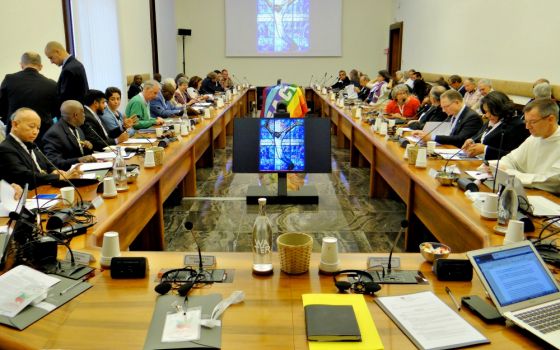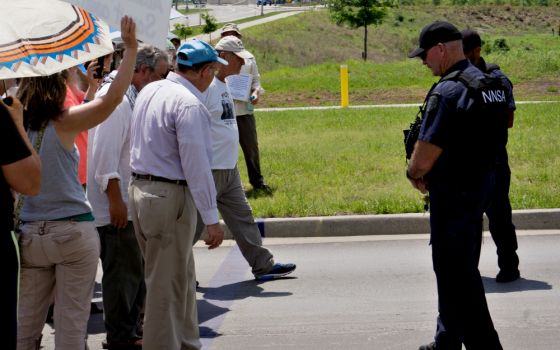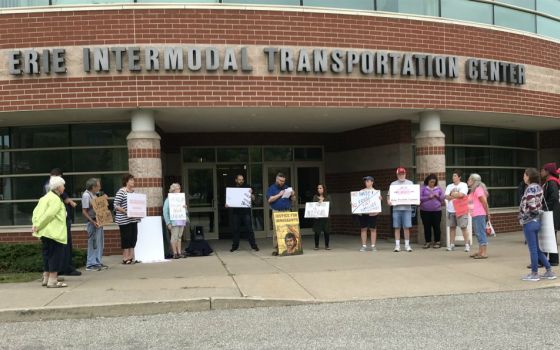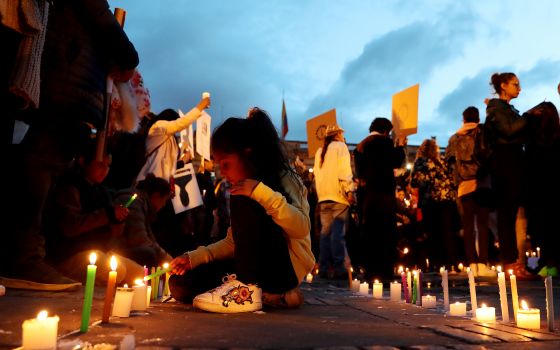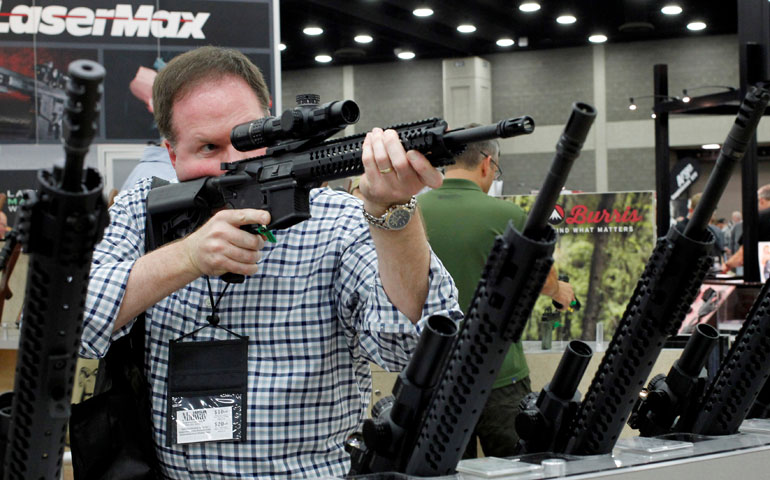
The Roman Catholic church has, in recent years, become increasingly more vocal about gun violence. In his historic visit to Congress in 2015, Pope Francis explicitly condemned "deadly weapons being sold to those who plan to inflict untold suffering on individuals and society," prompting anger from gun rights advocates who interpreted his statements as a call for gun control. And in the wake of the Newtown school massacre, the U.S. Conference of Catholic Bishops made a significant push for Congress to pass laws addressing this epidemic.
For all of the church's progressively louder calls to end gun violence, however, the focus it has paid to this issue still pales in comparison to how loudly it has spoken on other issues involving the church's doctrine on the ethics of life. Among those issues, of course, are those of abortion, euthanasia and capital punishment -- all practices that the church has vocally opposed for many years, congruent with its goal of proffering, as Cardinal Joseph Bernardin coined the phrase, a consistent life ethic.
The best point of comparison, however, is found in the church's stance on war -- its positions on collective self-defense (as opposed to the individual self-defense that gun violence generally implicates). On the ethics of war, the church has a rich history; classical "just war" theory itself is rooted heavily in the teachings of St. Augustine and St. Thomas Aquinas.
Classical just war theory comprises principles governing what happens before undertaking war (jus ad bellum), as well as principles that govern what happens during war (jus in bello). For example, jus ad bellum dictates that war must always be a last resort, while jus in bello dictates that when war has already been undertaken, any particular use of force is permissible only if it advances a legitimate objective without disproportionately causing harm to civilians.
These very teachings provide a natural place for the church to develop a more coherent and comprehensive stance on individual self-defense -- and, particularly, on the legitimate (and illegitimate) uses of firearms for self-defense.
In particular, the church can argue that, even as a more conventional means of self-defense, guns still systematically frustrate many basic principles of self-defense. The church could argue that, by their very nature, guns in reality encourage people to think that they have exhausted all nonviolent options in a particular scenario, and that violence is the last resort.
Relatedly, the church could also argue that, by their nature, guns encourage people to think that violence is justified even in scenarios where they are not physically threatened.
Another jus ad bellum principle is that of just cause -- meaning that, as the church has stated, force may be used only to correct a grave evil, like aggression or the mass violation of human rights.
Applying this principle to individual self-defense, guns are part and parcel of a culture -- as also manifested in so-called "stand your ground" laws -- that encourages people to see "just cause" in endeavors like defending one's honor or property, even absent any real imminent bodily threat. These laws encourage the escalation of precarious situations that, even if self-defense in one instant might be legitimate, could have been avoided entirely.
Other traditional principles are also useful in this context. For many ardent gun rights advocates, the principle of proportionality is irrelevant: To them, the liberty to own and use a gun is absolute, regardless of the cost to life. But this principle is relevant to the church. And the church can argue that, despite being useful for self-defense in some cases, in just as many, if not more instances, guns cause disproportionate harm.
In many cases, guns promote unjustified fear and violent reaction, while in many other cases where force may be warranted, people will be unable to use guns accurately and harm either themselves or others. Even accepting that there are some instances when guns can be used in self-defense, the proliferation of guns in society, legal and illegal, causes disproportionate harm in the way of accidents and suicides as well.
So just as proportionality constrains the military from taking otherwise advantageous action if it might cost too many innocent lives, so should it constrain civilians in the case of self-defense.
Perhaps the most crucial principle is the jus in bello principle of discrimination, which requires distinctions to be made between combatants and noncombatants. Recognizing the realities of war, jus in bello allows for combatants to be regarded as just that, notwithstanding their humanity.
This allowance does not -- and should not -- exist outside of that limited context. During the Cold War, the U.S. bishops insinuated that most, if not all uses of nuclear weapons would violate both the principles of proportionality and discrimination, because of the massive degree of indiscriminate harm that they cause. One could easily make a similar claim about civilian access to military-grade weapons, like assault rifles, that largely continue to be legally accessible in countries such as the United States.
But even handguns, or other more conventional weapons that one can use for self-defense (at least, theoretically) without causing wider harm to innocent individuals, are potentially problematic vis-à-vis these principles. As once again perfectly encapsulated in firearms incidents involving "stand your ground," guns, by their very nature, encourage viewing all people as potential threats and thus, in effect, "combatants."
Indeed, much of the religious rhetoric used to explain why guns are necessary in our society promotes this very view: This rhetoric -- which is also harnessed in support of a more aggressive stance on war, as well as of the death penalty -- argues that individuals must be "outcast" from society if their actions merit it.
In essence, this language encourages "otherization," which, in this context, results in people -- and inevitably those of certain minority groups -- being seen not for their value, but for their risks.
The church can, and must, do more to build a comprehensive theory on the evils of gun violence, in much the same way that the U.S. bishops built out an entire theory on the evils of nuclear weapons. Consistent in its affirmation that human life has inherent dignity that must be protected, the church already has a rich tradition from which it can draw.
It is clear enough that Christians are not to let fear motivate their treatment of even people who do pose some physical danger to them -- a principle manifested in Biblical stories like the interactions of Jesus with those carrying leprosy.
Instead, Christians must see all people as human beings -- breathing, reflective creatures who are simply attempting to lead lives that are meaningful to them. These are characteristics that endure, regardless of the mistakes, including even the sins, they are perceived to have committed. And we would value these characteristics not by sanctioning wide berth to use firearms because they save some lives, but by calling for limitations tailored to preventing the greater costs that guns ultimately impose.
To ignore this calculus, and to stand by as society gives larger and larger berth to this practice, is to affirm the practice of treating guns, not human life itself, as sacred.
On this powerful principle of loving, not fearing, other human beings, the church has built an enduring legacy with respect to a number of other aspects of its ethics of life. With momentum behind it, now is as good a time as any for the church to elevate gun violence to that same level.
[Marvin Lim, based in Atlanta, is an attorney for the Campaign to Keep Guns Off Campus.]
